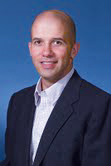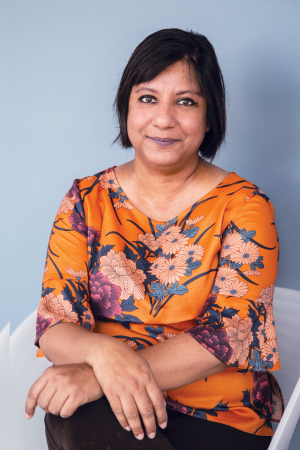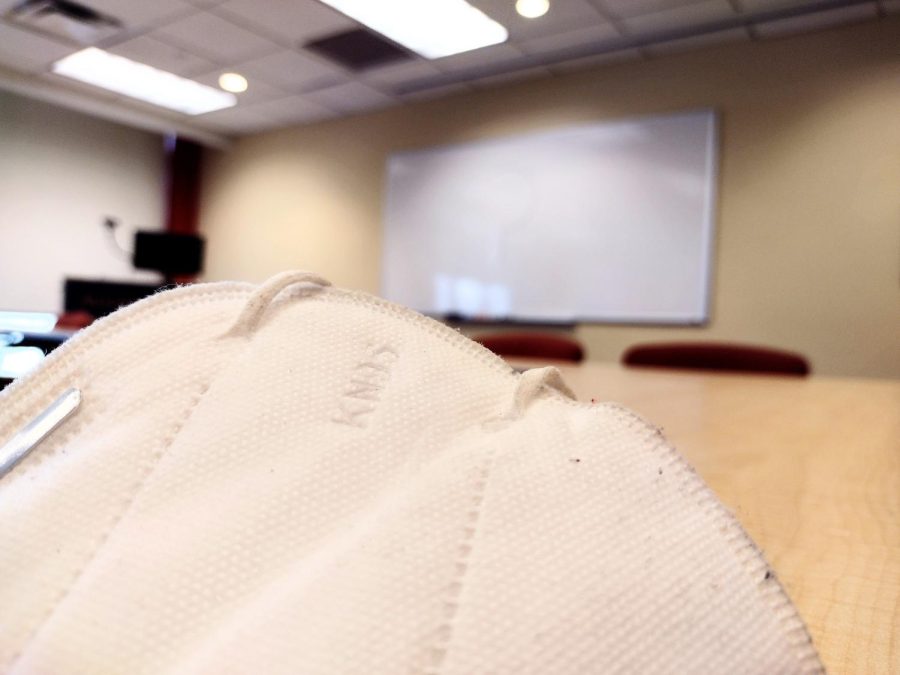Two years in, are masks still relevant?
How face coverings linger in Allegheny classrooms
Masking, a ubiquitous practice at the beginning of the pandemic, has become an optional part of the Allegheny student experience.
Today marks two years since the World Health Organization formally declared COVID-19 a pandemic.
Allegheny College required all students to leave campus for Spring Break, anticipating at the time that just three days of remote instruction would be needed before in-person classes could resume. Instead, it took five months before students could return, and they did so under a mask mandate from the newly-created Allegheny College Health Agency.
Now, three semesters later, masking guidelines at Allegheny are more relaxed, particularly for those who are vaccinated.
“Some people will continue wearing their masks by choice, despite being vaccinated,” the ACHA’s current masking policy reads. “Others will be complying with the College’s policy for unvaccinated persons. Regardless of vaccine status, if you feel ill, it is always a good idea to wear your mask. Gators are compassionate and do not ask others about mask choices.”
This policy has been in place — save for a classroom mask mandate in module one — since the college’s Pandemic Plan for the 2021-22 academic year was announced via email on July 23.
As the academic year began, Associate Professor of Music and Director of Choral Activities James Niblock, ’97, thought that extra precautions needed to be taken for his choir classes. So, pursuant to research on the spread of aerosols in singing venues, he strongly encouraged his students to keep masking even as the ACHA lifted such requirements.
“Coming back in the fall, I spent quite a bit of time trying to gather as much information as I could, looking at what our space is, the number of people, what kind of distancing requirements were appropriate and possible,” Niblock said. “What made the most sense was to just continue encouraging people to mask.”
Niblock said that he encouraged students to do so because choir classes depend far more heavily on collective participation than other classes at the college.
“We are made stronger as a group, not individually,” Niblock said. “We want every individual to be able to bring their best to the group. But having eight individuals is not as strong for us as having 12 individuals, and having 12 is not as strong as having 35. So as a community of singers we’re not in the same type of bubble precisely that you’d experience in a typical classroom.”
To help protect the musical bubble, Niblock included an addendum on COVID-19 practices with his fall 2021 syllabus for his Music 115, 116 and 119 classes. This section included recommendations from both the CDC and professional choir organizations like the American Choral Directors Association to continue masking. Under the latter was the line, “singers should wear masks — no exceptions.”

“I’m not looking to undermine the mandates of the health agency,” Niblock said. “I’m really grateful that we live and work in a community that requires vaccination and provides testing, but I also am wary of the fact that all of the evidence that we’ve had to date suggests that singing does present a little bit of additional risk in terms of the amount of aerosol that’s generated and the possibility of transmitting the disease. When you couple the additional risk with the fact that any additional interruptions would really severely limit our progress musically, I think it’s worth whatever extra mitigation we can throw at it.”
He added that he was not policing students who chose not to wear a mask, but rather discussing the issue with them in a classroom environment.
“I think it’s a comfortable understanding that we all feel like this is something that we’re doing in support of our mutual goals as musicians, and also as a community of people that care about one another,” Niblock said.
For this semester’s syllabi, Niblock has also added a line to the top of his document outlining COVID-19-related practices that explicitly states that masking is not required in any classes.
The musical bubble popped for the department towards the end of the fall semester; Niblock, who chairs the department, noted that scheduled performances in the month of November were disrupted because students contracted COVID-19.
“We want to be in full force at our rehearsals and we want to be in full force at our performances,” Niblock said. “Concern about infections and positive tests is then compounded by contact tracing, because if we start to take people in and out of the mix for either reason that affects our musical progress.”
Niblock is not the only professor to include masking language in his syllabi that differs from the ACHA’s policies. In her syllabus for her COMM 276 “Digital and Integrated Branding,” Professor of Communication Arts Ishita Sinha Roy included a line about masking.
“Students can choose to get a letter grade boost to the course grade if they wear a mask in class through the semester,” the syllabus stated in a copy provided to The Campus.
That line, included under the “Attendance and Class Participation” section of the syllabus, was highlighted with red coloring. Sinha Roy said that the line was not intended to force students to wear masks.

“It’s not any kind of rebuttal of institutional policy,” Sinha Roy said. “It is actually part of an assignment (which) ties back to what we’ve been doing in class with regards to preparing for the workplace, but also media literacy. From day one, we’ve been talking very closely about what happens when you don’t read for detail; that’s one concern that if you go into the workplace, and you haven’t read the details in signing a contract, you could inadvertently overlook the really important stuff resulting in both personal and professional loss.”
This assignment falls under what Sinha Roy called, “disruptive learning,” and she also created it because she felt like students were not fully reading her syllabi and longer assignments and missing key details.
“Where it hurts students is in other areas like plagiarism,” Sinha Roy said. “Very often we hear students saying, ‘I don’t know, I didn’t know (the policy).’ But when you go back to the assignment or syllabus, you’re able to point out, ‘hey, here’s a whole section where that was discussed.’ Or, and this is becoming more common in my sample size of one, I find students think they have understood the assignment but the work they turn in is completely different because the details below might have added some deeper understanding of what the assignment was seeking to do.”
Though initially planned to last the entire semester, Sinha Roy decided to hold the discussion early after being contacted for an interview.
“I knew The Campus was doing a piece, so I ended my assignment,” Sinha Roy said. “We had great discussions, including students talking about how they knew they should have challenged it, but they were going to (mask) for extra credit. We talked about the ethics of things, we talked about sources, cross checking, (and) a lot of them had just missed it. So it was great in that teachable moment that I had been aiming for.”
Sinha Roy added that both students who participated and those who did not received credit for the assignment.
“In my class, there is a label grading policy,” Sinha Roy said. “Everyone has the opportunity — regardless of what might seem in that statement (from the syllabus) as an extra reward but is not — everyone has the opportunity to get an A, in the class. So when we discovered this, the people who masked got bonus points (and) the people who didn’t mask got bonus points because they participated in the exercise.”
Sinha Roy included similar language in her syllabi for her FSCOM 201 “The Stories We Tell…” and COMM 386 “Branding, Identity, and Politics” classes. For both classes, masks were included in the list of “required materials.”
“Because of the uptick in the Delta variant COVID cases, let’s take care of our classroom community and mask up, even if we’re vaccinated,” Sinha Roy wrote in the syllabus. “I know it’s foggy and hard, but we can become carriers of the virus, or even sick, if exposed to someone with asymptomatic COVID-19.”
This statement, Sinha Roy said, was in line with the college’s policies.
“I recommended (wearing a mask) for safety’s sake, as the CDC was doing too,” Sinha Roy said. “The mask was because there were points in the last semester, when we were advised — so we were still following social distancing, if you remember, and we still had masking in class. Where we got rid of (masking) was at the start of module one. So module one, was when I just said that you can start to ease but (the) Omnicon (variant) had gone on the rise in module one. The policies were changing all around.”
However, the college’s pandemic plan for fall 2021 stated that masking would be optional for fully vaccinated students and only required for unvaccinated students.
Gabrielle Morrow, replying for the ACHA, told The Campus that she was unavailable for comment.
Sinha Roy emphasized that she did not mandate masks for any of her classes.
“There was never any negative, ‘oh you’re not wearing a mask therefore (you’re) evil, here’s a mask, wear it,’” Sinha Roy said.
Allegheny’s precedent alternatively suggests that a hard-and-fast classroom rule is not necessary for the administration to respond. According to previous Campus coverage, when Associate Professor of Psychology Allison Connell-Pensky encouraged mask-wearing in one of her classes last fall, she was contacted by Provost and Dean of the College Ron Cole, ’87, to have a discussion about the masking policy at Allegheny.
While Niblock was grateful for the college’s response, he also questioned the viability of having a single blanket policy across the entire campus.
“People have to wear safety glasses in the chemistry laboratory; that doesn’t mean that we’re going to make everyone wear safety glasses all the time, everywhere on campus,” Niblock said. “If you’re a dancer, you can’t go on the basketball court with your tap shoes on, nor can you go on the dance marley with your court shoes on if you’re a basketball player.”
Moving forward, Niblock thinks that the college should err on the side of caution. He thinks the community should aim to protect the most vulnerable of its members, not just the average member or the majority of members.
“I guess one of the questions that I think we should ask is, ‘what does it really cost us to be more cautious?’” Niblock said. “I understand that some people find it inconvenient (to mask). Others find it uncomfortable, other people feel it really is infringing on part of their experience. But I just think that what we’ve been through has been really difficult, and it warrants pretty careful consideration of how we bounce back. How do we find our way to the next mile marker while protecting the most vulnerable of our friends and colleagues?”

Sami Mirza is a senior from many different places. He is majoring in International Studies with a focus on the Middle East and North Africa and minor in...









